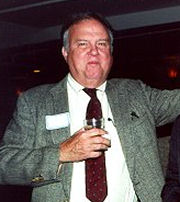Bitter Tea
I missed David Poland’s 7.24 summary of an old media vs. new media dustup that largely occured the day before, but better late than never. The highlight was a short but stinging criticism of Time magazine critic and documentarian Richard Schickel by Hollywood Reporter columnist and RiskyBiz blogger Anne Thompson for a recent and obviously resentful Schickel diss of online film critics and columnists.
Poland’s account opens with a 7.23 Cathy Siepp guest editorial in the L.A. Times that laments a persistent tendency of old-media Times staffers to diss online writers and reporters in a clueless and petty way. (Poland has been one of the dissees in a David Shaw piece that ran in the Times five years ago.)


Time film critic, author and documentarian Richard Schickel; Hollywood Reporter columnist Anne Thompson
Then it shifts over to the brief Schickel-Thompson contretemps, which was over a remark in a Schickel-penned book review that ran in the 7.23 L.A. Times. Schic- kel began his piece with a diss of online film columnists by saying that the current film-writing “pendulum seems to be permanently stuck at the burbling end of the spectrum, where the bloggers — history-free and sensibility-deprived — weekly blurb the latest Hollywood effulgence and are rewarded by seeing their opinions bannered atop movie display ads in type sizes elsewhere reserved for the outbreak of wars and the demise of presidents.”
This brought a response from Thompson titled “Is Time‘s Richard Schickel out of date?”, and it said the following: “Is Schickel feeling the pressure of younger critics nipping at his heels? Enough. If you’re too outmoded to understand today’s movie aesthetic — or the existence of many blogs that feature excellent film criticism, along with the ones that don’t — stop writing about them. Schickel is a terrific book writer, documentary filmmaker and voiceover artist. There are plenty of worthwhile activities to keep him busy.”
< ?php include ('/home/hollyw9/public_html/wired'); ?>
Do most online film columnists exude the aesthetic sensibility and historical perspective of, say, Schickel or Charles Taylor or David Edelstein? Some don’t. But there are just as many (if not more) insufficiently cultivated writers in the print world as in the cyber, and what certain online pundits may lack here and there in terms of cultured perspective and/or sophistication is more than compensated for with their passion and to-die-for particularity.
It’s widely recognized, I think, that online film writers convey far more in the way of personality and hot-blood conviction than old-media types, who, I sense, are often constrained by their editors’ insistence upon conveying a tone of measured semi- dispassionate journo-speak. Obviously not always — I ‘ve always loved the honed precision of Schickel’s Time reviews along with those by print guys Joe Morgen- stern, David Ansen and Peter Rainer (among dozens of others) but I sometimes wonder what these guys really, really think deep down, and how they’d phrase it if they’d let their hair down a bit.

But of course, Schickel’s ire is mainly about the attention the online pundits are getting by way of quotes in print ads. My God…this is one of the brightest, most learned and most sophisticated film critics in the world, and with these words Schickel has put on the cloak of a grumpy old coot swatting at pesky young whippersnappers nipping at his professional heels. He and some of his brethren obviously feel threatened by the encroaching presence and power of the online film crowd. As well they should.
Shickel should really try and shake this attitude off. He knows all about the dynamics of change and how young conquistadors have always moved up and eventually displaced the entrenched. Nobody wants to be the older guy who doesn’t get the new sensibility, but it happens to the best of them. It’s an old story. Where’s his perspective?
A similar kind of old order-new order clash between film writers and their editors happened 46 years ago in the case of a young upstart critic named Andrew Sarris. In the summer of 1960 Sarris was lambasted in some Manhattan editorial circles for writing far too seriously and respectfully about Alfred Hitchcock‘s Psycho, which obviously casts Sarris in a perceptive forward-thinker mold by today’s standards.
Three years later N.Y. Times critic Bosley Crowther, easily the biggest frog in the pond back then, ran a rave review of Joseph L. Mankiewicz’s Cleopatra. Try and find anyone today who feels Cleopatra is even a half-good film. (I think the opening 20 minutes with Rex Harrison are pretty good, but then Elizabeth Taylor rolls out of that Persian carpet and it all goes to shit.)

Later that year Crowther expressed dismay at the impudence of Dr. Strangelove, and particularly its lack of respect for the U.S. military. Four years later Crowther viciously panned Bonnie and Clyde, and that was it. He was over. The culture had passed him by.
Crowther’s fuddy-duddyisms and Schickel’s disdain of new-media film writers obviously aren’t analagous in every respect, but the older-guy analytical tendencies are, I feel, at least somewhat similar. Older entrenched writers don’t tend to get new stuff as completely as younger, not-as-corporately-connected writers, and some of them tend to bash avatars of the new for being crude or pandering or not worldly enough. But worlds change.
